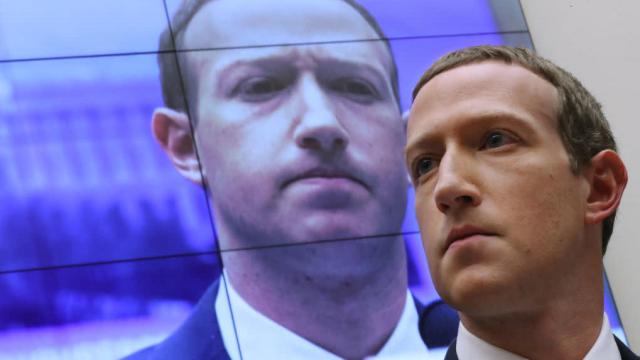Mark Zuckerberg, America’s pluckiest boy-technocrat and the inventor of the Retreating Bowl Cut, sat before the U.S. House Financial Services Committee for a marathon six-hour hearing Thursday. In theory, he was there to talk about his attempts to prop up a new worldwide currency. In practice, he was grilled about nearly every aspect of his business.
Presumably, you don’t have a full six hours to devote to the doldrums of government-at-work — you’re here for the rare glimmering moments when an enormously powerful individual was embarrassed on the national stage. And really, who are we to deny you that small joy?
The hits began with Maxine Waters’ opening remarks, where she asked Facebook to “concentrate on addressing its many deficiencies and failures” rather than continue work on its Libra cryptocurrency project. Nydia Velazquez went as far as calling Zuckerberg a liar outright. But bluster, raised voices, and interruptions are hallmarks of public hearings like these. Fortunately, this time around — and in stark contrast to the previous times Zuckerberg has been called to the Hill — many lawmakers seemed genuinely prepared to ask difficult questions (with the exception of nutjobs like Bill Posey, who used his five minutes to rant against vaccinations for whatever reason).
Illinois Democrat Bill Foster was the first to nail Zuckerberg down on the details of his cryptocurrency. No great surprise there: Foster is a Harvard-educated physicist who has worked in the AI space, and Libra’s plans are, at best, half-assed. When pressed, the Facebook CEO wasn’t able to affirmatively state: if Libra would allow for anonymous transactions (something that creates opportunities for digital currencies to be used for a variety of illicit activities); how Libra or Calibra would handle reversals in the event of fraud; or even how the project as a whole would make money. Although Foster’s time was early in the hearing, none of those questions were satisfactorily answered in the exchanges that followed.
Although Zuckerberg has repeatedly stressed that Libra would not share financial data directly with Facebook, at no point did he state whether or not customer finance data would be sold to third parties as a possible path to profitability. We’ve reached out to Facebook for comment to see if that’s the project’s intent.
As mentioned though, this hearing was less a focused dissection of Libra and more an open forum to gripe about a firm with vast monopolistic power which is in a tremendous, ongoing policy failure. Take, for example, Facebook’s dubious, well-documented labour practices (which sadly are in no way exception in Silicon Valley).
Katie Porter, who made an efficient use of her first few minutes to tear into Facebook’s legal arguments in a data breach case currently being argued in federal court, brought up the issue of the company’s content moderators — independent contractors tasked with sifting through the site’s most graphic and psychologically troubling content. “These workers get nine — nine! — minutes of supervised wellness time per day,” Porter said of these contractors, some of whom claim to have developed PTSD-like symptoms from repeatedly viewing disturbing content.
Zuckerberg often gives himself annual challenges, like learning Mandarin or coding an AI assistant. Although not explicitly framed as such, Porter asked the CEO to consider spending an hour a day for the next year performing the work of one of these content moderators. He declined, stating, “I’m not sure that it would best serve our community.”
Rep. Katie Porter challenges Mark Zuckerberg to work as a content moderator and view the same violent, disturbing videos Facebook contractors do https://t.co/iVB9nAcvHO pic.twitter.com/TfPuXkiJp8
— Bloomberg Technology (@technology) October 23, 2019
Of course there were smaller gaffes of unpreparedness sprinkled throughout: Mark not being aware if any of the CEOs of the Libra partner organisations were women; Mark not knowing how many lobbyists he pays; Mark not being able to remember which civil rights firm Facebook retains.
The last bit of fireworks however, was the result of questioning by freshman Democrats Sean Casten and Alexandria Ocasio-Cortez, both of whom ripped Zuckerberg for Facebook’s highly unpopular change in policy over political ads, which are now explicitly allowed to contain misinformation.
Zuckerberg’s defence is that if a politician is lying, American’s should know they’re liars. It’s simple and catchy, but crumbles under the scrutiny of specific examples. For instance, does the company’s hate speech policy supersede its laissez-faire ads policy when the politician in question is a member of the American Nazi Party?
.@RepCasten asked Mark Zuckerberg if a member of the American Nazi party who is running for office (which was the case last year in Illinois) can speak on @facebook in a different fashion than a member of the Nazi party who is not running for office.
Zuckerberg could not answer. pic.twitter.com/4a8cTPEAAA
— The Leadership Conference (@civilrightsorg) October 23, 2019
“I think that depends on a bunch of specifics” isn’t the stunning riposte Zuckerberg had probably hoped it would be. “I think lying is bad” also didn’t quite land, though his stumbling was considerably worse when confronted by Facebook’s ongoing partnership with far-right website The Daily Caller remaining an independent fact-checker for the site.
completely befuddled. pic.twitter.com/n0RjyZZvQ1
— Timothy Burke (@bubbaprog) October 23, 2019
As Rep. Patrick McHenry said in his comically flat conclusion to the testimony, “I’m not sure we learned anything new here [about Libra].” Partly that’s because the few representatives who came with specific enough questions about the project weren’t given specific answers.
Then again, when the CEO of a company more powerful than most nations has this many roastable failures under his belt, why limit yourself to dunking on a largely imaginary project, even if it’s one whose purpose is as galling as “control the world’s monetary supply”?
